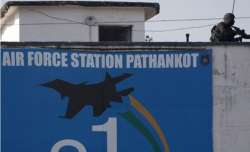Something 'seriously wrong' with counter-terror establishment, no lessons learnt from Pathankot attack: Parliamentary panel
A Parliamentary committee has said that lessons have not been learnt from Pathankot attack and that there was something Seriously wrong with the counter-terror establishment.

Coming down heavily on the government for its alleged failure to prevent terror attacks on security installations, a Parliamentary committee has said that lessons have not been learnt from Pathankot attack and that there was something "seriously wrong" with the counter-terror establishment.
The Parliamentary Standing Committee on Home in its report, which was tabled in the Rajya Sabha today, took stock of overall performance of Ministry of Home Affairs.
Despite several steps reportedly taken by the government to strengthen security measures, it has "comprehensively failed" to prevent recurrence of such subsequent attacks in Jammu and Kashmir's Pampore, Uri, Baramula, Handwara and Nagrota, the report said.
"The Committee observes that the government has not learnt any lesson from the Pathankot attack," the panel noted, saying there remains an urgent need to further strengthen the security network and plug the "serious gaps" in security establishment and intelligence gathering/sharing that have come to the fore in the recent attacks.
The panel, headed by former Union Home Minister P Chidambaram, expressed its inability to understand that "in spite of terror alert sounded well in advance, how terrorists managed to breach the high-security air base and subsequently attack."
Taking note of the intelligence input and kidnapping and subsequent release of Punjab Superintendent of Police and his friends, the Committee wondered whether the security agencies were "so ill-prepared to anticipate threats in time and counter them swiftly and decisively."
"The panel feels that something is seriously wrong with counter-terror security establishment as despite the fencing, floodlighting and patrolling by Border Security Force (BSF) personnel, Pakistani terrorists managed to sneak into India from across the border," it said.
It also questioned the role of Punjab Police in the Pathankot air base attack, saying it took a long time in arriving at the conclusion that the abduction of its officer and his friends was not just a criminal robbery but was going to be serious national security threat.
"The Committee is unable to understand why the terrorists let the SP and his friend off, which should be thoroughly examined by National Investigation Agency (NIA)," the report said.
The Committee on Home Affairs said it is of the view that the role of narco-syndicate active in border areas of Punjab should also be investigated as the terrorists might have taken help of channels or networks used by smugglers to infiltrate the border, take shelter and carry out the terror attack.
Expressing its displeasure with NIA for not concluding its probe even after a year, the panel said unless the investigation is completed at an early date, it will not be possible to answer the grave questions that were raised following the terrorist attack-- like, why was no preventive action taken despite credible intelligence inputs and why was no action taken despite interception of communication between terrorists and their handlers?
The Committee sought the response of the government on the visit of Pakistan's Joint Investigation Team and whether it was made clear to the neighbouring country that a team from NIA would also be visiting that country for collection of evidence.
The Committee was informed about the actions taken after Pathankot attack which included border domination by deploying one more battalion of BSF in Gurdaspur sector on Punjab Border, deploying technological solutions in two patches of 5-6 kilometers of riverine gaps and sensitive areas of Jammu Frontier, introduction of force multipliers and hi-tech surveillance equipment.
(With PTI inputs)
